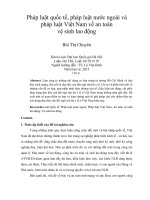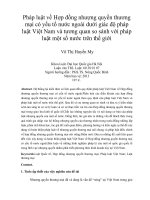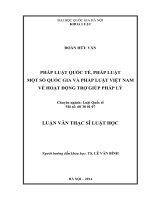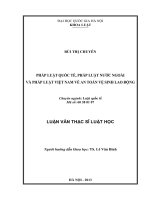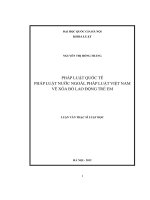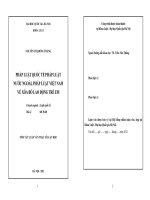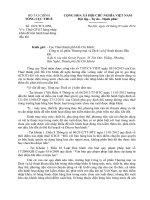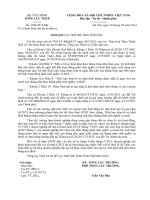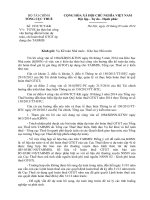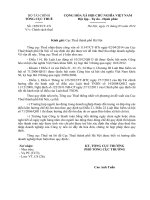Pháp luật điều chỉnh quan hệ lao động của người lao động nước ngoài tại việt nam trong thời kỳ hội nhập kinh tế quốc tế tt tiếng anh
Bạn đang xem bản rút gọn của tài liệu. Xem và tải ngay bản đầy đủ của tài liệu tại đây (395.38 KB, 27 trang )
MINISTRY OF EDUCATION AND
MINSTRY OF JUSTICE
TRAINING
HANOI LAW UNIVERSITY
TRAN THUY HANG
THE LAW REGULATING LABOR RELATIONS
OF FOREIGN WORKERS IN VIETNAM IN THE
INTERNATIONAL ECONOMIC INTERGRATION
PERIOD
Major : International Law
Code : 9 38 01 08
THE SUMMARY OF THE PhD THESIS
HA NOI – 2019
The PhD Thesis was accomplished at:
HANOI LAW UNIVERSITY
Supervisors :
1. Assoc. Prof. Nong Quoc Binh
2. Doctor of Law. Do Ngan Binh
Critique 1:
Critique 2:
Critique 3:
The PhD Thesis is defended at the Thesis Examining Board
Meeting held at Hanoi Law University at ...on.../.../
The PhD Thesis can be studied at:
1.
National Library
2.
Hanoi Law University's Library
THE LIST OF AUTHOR’S PUBLISHED ARTICLES
1. Hang Tran Thuy (2017), “Report on Vietnam’s Rules
Regulating Foreign Workers”, Japan Labor Issues, Volume 1 Number 3
November-December 2-17, p. 77-83.
2. Trần Thúy Hằng (2018), “Policy attracting foreign workers to
operate in science and technology in Vietnam”, Journal of Law, Number
5/2018, p. 38-54.
1
PREAMBLE
1. Reason for choosing the topic
Vietnam has advocated receiving foreign workers since 1985 to meet
the demand for domestic production and business (Article 16 of Vietnam
Foreign Investment Law 1987). Regulations on the recruitment and hiring
foreign workers in the Labor Code 1994 have been inherited and supplemented,
together with the provisions of the previous period. For the professions that
Vietnamese workers have not been able to do, enterprises may recruit a certain
number of foreign workers for a certain period. The Labor Code 2012, effective
from January 1, 2013, has separated regulations on the labor activities of foreign
workers in Vietnam in Section 3 Chapter XI, from Article 169 to 175 and
supplemented by Decrees and Circulars detailing and implementing several
articles of the Labor Code on foreign workers in Vietnam. Also, in the context
of international economic integration, Vietnam has signed a series of labor
cooperation agreements, free trade agreements, joined 21 conventions of the
World Labor Organization. Accordingly, the issue of protection of rights and
basic labor conditions is receiving increasing concern. Since 2016, Vietnam has
continued to implement the commitments in the ASEAN Framework
Agreement on Services to fulfill the objective of movement freedom for skilled
workers. These international treaties create an international legal basis to
regulate labor relations of the Vietnamese workers and foreign workers
working in Vietnam.
Through a process of development, the law regulating labor activities
of foreign workers has been increasingly improved to adapt to the diverse
economic growth of the country. The legal provisions are quite detailed, which
focus primarily on the employing requirements and work permit for foreign
workers working in Vietnam. However, the number of regulations in Vietnam
2
is quite small; the content is simple, overlapping and low enforceability.
Meanwhile, since the need for skilled labor is increasing due to the impact of
the technological revolution 4.0, the reception of foreign workers is a practical
solution to offset the domestic shortage of labor. But to formulate a system of
the legal norm to meet the needs and the development of the economy,
comprehensive and extensive research on the law regulating labor relations of
foreign workers in Vietnam is required. Therefore, the research on the law
regulating labor relations of foreign workers in Vietnam is necessary for the
current period.
2. Research objective and scope of the thesis
The thesis focuses on studying the current provisions of Vietnamese
law, the provisions of international treaties to which Vietnam is a member, and
the judgments of Vietnamese courts dealing with disputes on individual labor
relations of foreign workers.
With the research objective as mentioned above, the scope of the thesis
includes basic theoretical issues about labor relations and the law regulating
labor relations of foreign workers; current provisions of international law and
the bill of foreign countries regulating labor relations of foreign workers;
current provisions of Vietnamese legislation regulating labor relations of
foreign workers.
3. Research aims and mission of the thesis
The aim of the thesis includes more in-depth analysis of fundamental
theoretical issues of the law regulating labor relations of foreign workers;
analysis and evaluation of the current practice of legislation regulating labor
relations of foreign workers in Vietnam. Based on these analyses, the thesis
proposes some specific recommendations and solutions to improve the legal
regulations and improve the effectiveness in implementing legislation
3
regulating labor relations of foreign workers
To achieve this purpose, the author must fulfill the specific tasks as
follows: (i) Formulate the concept of foreign workers in Vietnam. (ii) Develop
a concept of labor relations and identify the characteristics of labor relations of
foreign workers. (iii) Clarify the fundamental theoretical issues of the law
regulating labor relations of foreign workers. (iv) Assess the comprehensive
legal basis regulating labor relations of foreign workers. (v) Propose several
specific solutions to improve the legislation and enhance the effectiveness of
implementation to create a stable and favorable legal environment for the
development of labor relations with foreign elements, to protect the
constitutional rights and interests of foreign workers in Vietnam.
4. Methodology and research methods
In studying the law regulating labor relations of foreign workers in
Vietnam, the thesis uses the theoretical basis, including The doctrine of
Marxism – Leninism and Ho Chi Minh's Thoughts on State and Law,
knowledge systems, perspectives on law and legal implementation of the
Communist Party and the State of Vietnam.
The thesis mostly focuses on the following research methods: Legal,
scientific research method, Comparative law method, Analytical method,
Proving method, Synthesis method, Scientific forecasting method.
5. Scientific meaning and novelty of the thesis
This thesis provides new scientific contributions as follows:
First, the dissertation has systematically analysed fundamental
theoretical issues of the law regulating labour relations of foreign workers. It
has developed the concepts of foreign workers and labour relations of foreign
workers, thereby, identifying the characteristics of labour relations of foreign
workers in Vietnam.
4
Second, the dissertation has comprehensively analysed fundamental
legal issues on adjustment of labour relations of foreign workers in accordance
with the law of Vietnam and international treaties to which Vietnam is a
member and offered comments on judgments of Vietnamese courts dealing
with individual labour disputes arising from labour relations of foreign workers,
and thereby indicating the inadequacies of the implementation and
interpretation of legal provisions on labour relations of foreign workers in
Vietnam.
Third, the dissertation has identified experiences of some developed
countries in regulating labour relations of foreign workers. On that basis, the
dissertation offers some proposals for improving the law of Vietnam regulating
labour relations of foreign workers consistently with Vietnam's socio-economic
conditions in the period of international economic integration.
6. The theoretical and practical meanings of the thesis
The thesis contributes to formulating and perfecting the theoretical
basis and perfecting the law regulating labor relations of foreign workers in the
context of international economic integration; At the same time, to a certain
degree, this thesis will be a valuable source of information to aid policymakers,
legislators, and managers in making and implementing provisions of legislation
regulating labor relations of foreign workers in Vietnam. The thesis is also a
reference for research and teaching of labor law, private international law
Faculties, and Universities specialized in law or labor and social affairs.
7. Structure of the thesis
With the aims mentioned above and tasks, the thesis is presented in 4
chapters. Also, the thesis includes Introduction, List of Abbreviations,
Conclusion, List of other works published by the author, References, and
Appendices.
5
Chapter 1: Overview of the studies related to the thesis topic.
Chapter 2: Theoretical issues in labor relations of foreign workers and
the law regulating labor relations of foreign workers
Chapter 3: Current practice of the law regulating labor relations of
foreign workers in Vietnam
Chapter 4: Perfecting the law and improving the effectiveness of
implementing the law regulating labor relations of foreign workers in Vietnam
Chapter 1
OVERVIEW OF THE STUDIES RELATED TO THE
THESIS TOPIC
The studies on the law regulating labor relations of foreign workers
are diverse and are carried out under many different aspects. Regarding foreign
workers as the research topic, there are many authors conducting research, with
many studies from different perspectives. The studies presented the general
theoretical issues of foreign worker management, such as scientific bases, legal
bases and practical bases of foreign workers for socio-economic development
of our country systematically. Regarding the law regulating labor relations of
foreign workers as the research topic, there are no intensive and comprehensive
studies about the law regulating labor relations of foreign workers in Vietnam.
The existing studies only focus on some different issues, such as managing
foreign workers, protecting the rights of foreign workers, labor contracts of
foreign workers. Analyses on the inadequacy of legislation and
recommendations to perfect the legislation are generic, without comparing and
absorbing the experiences on this topic of countries in the world.
From the existing studies as well as the aim and research tasks of the
thesis, within its research scope, the thesis focuses on clarifying the following
issues:
6
First, theoretical matters. Based on existing studies related to the thesis
topic, the thesis will explain some issues such as the legal basis of legislation
regulating labor relations of foreign workers, conflict of laws.
Second, practical legal issues. The emergence and development of
statutory provisions for foreign workers working in Vietnam have been
generally presented, analyzed and commented by many studies. The thesis will
absorb this knowledge to clarify the legal framework regulating labor relations
of foreign workers in Vietnam.
Third, issues of practical implementation of the law regulating labor
relations of foreign workers in Vietnam and the issues on orientation and
solutions. The thesis studies the experience in management and solutions in
each country, especially countries with developed labor markets which use
international human resources effectively.
Chapter 2
THEORETICAL ISSUES IN LABOR RELATIONS OF FOREIGN
WORKERS AND THE LAW REGULATING LABOR RELATIONS
OF FOREIGN WORKERS
2.1. The concept of foreign workers and labor relations of foreign
workers
2.1.1. The concept of foreign workers
2.1.1.1. Definition
The author proposed the concept of foreign workers in Vietnam as
follows: "Foreign workers are foreigners who come to Vietnam to work under
labor contracts, are paid and subject to the management and administration of
employers.”
2.1.1.2. Classification of foreign workers
First, based on skills, foreign workers are divided into two categories:
7
skilled workers and unskilled workers. Second, based on legal status, foreign
workers are divided into two categories: legal foreign workers and illegal
foreign workers. Third, based on nationality, foreign workers are divided into
different categories depending on the laws of the country and international
treaties on the reception of foreign workers of which the country is a member.
Fourth, based on allowing the duration of residence in the host country, foreign
workers are divided into two categories: foreign workers with permanent
residence and foreign workers with temporary residence.
2.1.2. Concepts and characteristics of labor relations of foreign
workers
2. 1.2.1. Definition
The author proposes to formulate the concept “labor relations of
foreign workers in Vietnam” as follows: “labor relations of foreign workers in
Vietnam are labor relations arising between foreign workers and employers
where foreign workers are hired and perform the work under the management
and administration of employers for wages.”
2.1.2.2. Characteristics of labor relations of foreign workers
The distinguishing features between labor relations of foreign workers
and normal labor relations are that the subjects have foreign elements; one of
the subjects is a foreigner. This characteristic makes labor relations of foreign
workers the subject matter of both labor law and private international law.
2.2. The basic theoretical issues on the law regulating labor
relations of foreign workers
2.2.1. The role of the law regulating labor relations of foreign
workers in the context of international economic integration
First, the law regulating labor relations of foreign workers creates a
legal basis for the parties to establish and execute legal labor relations.
8
Second, the law regulating labor relations of foreign workers creates a
legal basis for protecting the rights of foreign workers in labor relations.
2.2.2. The main sources of the law regulating labor relations of
foreign workers
2.2.2.1. International law
The system of global multilateral treaties, related to labor relations of
foreign workers, mainly focused on the protection of migrant workers' rights.
Some related issues to labor relations of foreign workers have been regulated
by regional multilateral treaties or bilateral treaties such as the issue of
determining the applicable law of labor contracts in private international law,
the issue of promoting freedom of movement of labor in the region, the issue
of protecting the rights of migrant workers.
2.2.2.2. National law
The legislation
Some countries position all regulations in a unified code, but in the
others, the provisions are scattered in different legal documents. From the
perspective of private international law, some countries in the world have legal
provisions for determining the applicable law for labor relations with foreign
elements and these provisions will also be applied to labor relations of foreign
workers. Some countries do not have legal provisions of applicable law for
labor relations with foreign elements, but there are provisions on applicable law
of contracts, including labor contracts.
2.2.2.3. Case-law
The role of case law depends on the views of each country. For
countries under the Common Law system, case law is defined as judgments
of higher courts that are binding to lower courts. For countries under the
Civil Law system, high court judgments are a valuable source of legal
9
reference for lower courts.
2.1.1.
The basic principles of the law regulating labor relations of
foreign workers
2.2.3 .1. Principle of non-discrimination
This principle requires that the host country shall treat foreign workers
without discrimination regardless of sex, race, color, religion or political view.
2.2.3.2. Principle of national treatment
Under this principle, foreign workers will be entitled to the same rights
as domestic workers as regulated by the law of the host country.
2.2.3.3. Principle of freedom of agreement of the parties in labor
relations
Regarding labor law, freedom of agreement of parties in labor
relations is widely recognized in the laws of most countries around the world.
This principle requires parties in labor relations to respect fair, voluntary, legal
agreements ... regarding rights, obligations, benefits, and responsibilities of
each party in labor relations. From the perspective of private international law,
in determining the applicable law of labor contracts, the choice of applicable
law by the parties prioritized. The choice of law by the parties shall be reflected
in labor contracts and will be the basis for the court to resolve disputes arising
from labor contracts.
2.2.3.4. Protection of legal rights and interests of employers
This principle requires the state to ensure that the rights and benefits
of employers under the law are implemented without being violated by others.
Employers are an indispensable part to form and maintain labor relations. By
protecting the legal rights and interests of employers, labor relations may
develop sustainably.
2.2.4. Several basic legal contents of the law regulating labor
10
relations of foreign workers in countries around the world
2.2.4 .1. Establishment of labor relations of foreign workers
Unlike the establishment of labor relations with domestic workers,
employing foreign workers is an activity limited by employment conditions,
which are requirements to limit the number of foreign workers in a country, that
done in two ways: (i) quotas (United States, South Korea, Singapore) and (ii)
employment standards.
2.2.4.2. Executing labor relations of foreign workers
When foreign workers meet the employment requirements, they will
participate in labor relations and become workers with full rights and
obligations under the law. Therefore, labor relations are executed based on the
mutual agreement of labor rights and obligations reflected from labor contracts
of foreign workers, and at the same time shall comply with specific legal
provisions of each country (Japan, Malaysia).
2.2.4.3. Termination of labor relations of foreign workers
The termination of labor relations of foreign workers is executed in
accordance with the general provisions of termination of labor contracts of
foreign workers. However, since workers are foreigners, legislation of some
countries have several additional obligations for employers of foreign workers
in case of premature unilateral termination.
2.2.4.4. State management of labor relations of foreign workers
The most common method of management is work permits.
Moreover, some countries even adopt regulations on the obligations of
employers in managing foreign workers.
2.2.5. Conflict of laws and methods to resolve conflicts of law in
labor relations of foreign workers
2.2.5.1. Conflict of laws in labor relations of foreign workers
11
Arising from the characteristics of labor relations of foreign workers
and the characteristics of conflict of laws, conflict of laws in labor relations of
foreign workers may be defined as follows: Conflict of laws in labor relations
of foreign workers is a legal phenomenon that occurs when labor relations of
foreign workers can be regulated by two or more legal systems of different
countries.
2.2.5.2. Methods of resolving the conflict of laws in labor relations of
foreign workers
Conflict of laws method
The conflict of laws method is the method in which countries formulate
and use conflict of laws norm to regulate labor relations of foreign workers.
Conflict of laws norm is a special type of legal norm, which does not contain
the rights and obligations of subjects, but contains the principle on choosing the
applicable law for existing labor relations of foreign workers.
Substantive law method
The substantive law method is the method in which countries
formulate and use substantive legal norm to regulate labor relations of foreign
workers. The substantive legal norm is a traditional legal norm, containing the
specific rights or obligations of the subjects. The substantive legal norm in labor
relations of foreign workers is often used to regulate the conditions, standards,
rights, and responsibilities of foreign workers and employers in labor relations.
Chapter 3
CURRENT PRACTICE OF THE LAW REGULATING LABOR
RELATIONS OF FOREIGN LABORERS IN VIETNAM
3.1. Provisions in international treaties to which Vietnam is a
member
3.1.1. Provisions on basic labor rights and protection of foreign
12
workers
Provisions on basic labor rights in international treaties to which
Vietnam is a member is regulated by the International Labor Organization
(ILO) Conventions, legal documents within the framework of the Association
of Southeast Asian Nations (ASEAN), and in new generation free trade
agreements (FTAs). Accordingly, the basic labor rights of foreign workers are
protected in the same way as the basic labor rights of Vietnamese workers,
including the right against forced labor, right against discrimination in
employment, right to equal pay.
3.1.2. Provisions of the applicable law regulating labor relations in
mutual legal assistance treaties
Conflict of laws provisions in the treaties on mutual legal assistance
allows the parties of the labor relations to choose applicable law of labor
contracts if the chosen law does not prohibit this choice.
3.1.3. Provisions on the working form of foreign workers
Protocol on the Accession into WTO of Vietnam, in commitments on
trade in services, there are two modes of supply under which foreign workers
can come to Vietnam to work: commercial presence and presence of a natural
person. For foreign workers who come to Vietnam to work, workers who are
internally reassigned in the enterprises which engage in 11 service industries in
the Vietnam’s WTO commitments on services, including: business,
communication, construction, distribution, education, environment, finance,
health, tourism, culture, entertainment and transportation do not have to apply
for work permits.
3.1.4. Provisions on the right to recognize diplomas and
qualifications of foreign workers having the nationality of ASEAN countries
Currently, ASEAN has signed 08 mutual recognition arrangements
13
(MRAs) in services including accountancy services, medical services, dental
services, engineering services, nursing services, architectural services,
surveying services, tourism services. According to the MRA on tourism
services, foreign workers who have training and certification of skills would be
recognized as qualified to practice tourism services in Vietnam without any
further requirements. As a result, except for the tourism services, in the
remaining MRAs, foreign workers having the nationality of ASEAN countries
coming to Vietnam for work and looking to be recognized qualifications as
"ASEAN experts" shall comply with the additional regulations and
requirements of Vietnamese law.
3.1.5. Provisions regulating the rights and obligations of employers
and foreign workers in labor cooperation agreements
The content of labor cooperation agreements is diverse, include basic
contents such as commitment to create favorable conditions for Vietnamese
workers to work in other countries and vice versa, determination of legal
mechanisms to ensure that employment was executed in accordance with the
regulations of the two parties, from the recruitment phase, implementation of
labor contracts and termination, repatriation of workers to home country.
3.2. Provisions of the Vietnamese law
3.2.1. Provisions regulating the establishment of labor relations of
foreign workers
3.2.1.1. Requirements for foreign workers
Foreign workers working in Vietnam are primarily foreign
nationals, satisfying the legal conditions required to be allowed to work in
Vietnam for Vietnamese or foreign organizations and individuals in
Vietnam. Conditions for foreign workers working in Vietnam is defined in
Article 169.1 Labor Code 2012.
14
3.2.1.2. Requirements for employers of foreign workers
Subjects allowed to employ foreign workers under labor contracts are
limited subjects (conditioned subjects) according to Article 2.2 of Decree No.
11/2016/ND-CP.
3.2.1.3. Working form of foreign workers
Requirements on working form are regulated in Decree No.
11/2016/ND-CP dated 3/2/2016, which is a general provision for all forms of
foreigners working in Vietnam, included foreign workers and other subjects
such as volunteers, contractors (performing work under service contracts),
people establishing the commercial presence (performing work related to the
establishment of a commercial presence in Vietnam, not directly providing
services).
3.2.1.4. Procedures for recruitment of foreign workers
The procedures for recruiting foreign workers is regulated by the
provisions of the Labor Code 2012, Decree 11/2016/ND-CP and Circular
40/2016/TT-BLĐTBXH by three steps: Step 1, employers determine the
need to use foreign workers. Step 2, employers apply for work permits for
foreign workers. Step 3, foreign workers and employers abroad sign a labor
contract.
3.2.2. Provisions regulating the implementation of labor relations of
foreign workers.
3.2.2.1. The validity of labor contracts of foreign workers
The Vietnamese law does not have a separate provision on the validity
of the labor contract of foreign workers. According to the general provisions of
the labor law on the validity of labor contracts, the points that can be determined
as a basis for labor contracts to be valid are: (i) labor contracts are valid from
the date the parties form the contract; (ii) labor contracts are valid from the date
15
of agreement; (iii) labor contracts are valid from the day workers to start
working.
3.2.2.2. Invalid labor contract of foreign workers
Labor contracts of foreign workers are totally invalid when they fall
into one of the following four cases: The entire content of labor contracts is
illegal; labor contracts are signed by unauthorized persons; the work that two
parties have agreed in labor contracts is prohibited by law; content of labor
contracts restricts or prevents workers’ right to establish, join and operate labor
union. Labor contracts of foreign workers are partially invalid when the content
of that section violates the law but does not affect the remaining of the contract.
3.2.2.3. Rights and obligations of subjects in labor relations of foreign
workers
The rights and obligations of the subjects in labor relations of foreign
workers are determined according to the content of the labor contract and the
provisions of law. The contents of the contract are agreed by the parties, but
shall not be contrary to the law, contrary to the collective labor agreement.
Labor contracts with foreign workers shall conform to the main contents as
stipulated in Article 23 of Labor Code 2012 and Article 4 of Decree
05/2015/ND-CP.
3.2.2.4. Form and language of labor contracts with foreign workers
Labor contracts of foreign workers, even if labor contracts are for
temporary or short term work, foreign workers and employers still have to make
contracts in writing.
3.2.3. Provisions regulating the modification, suspension,
termination of labor relations of foreign workers
3.2.3.1. Modification of labor relations of foreign workers
16
In the case of the subject of labor contracts is modified: the
modification of foreign workers or employers is regarded as a new labor
contract. In the case of the content of labor contracts is modified: the
modification of the contents of labor contracts with foreign workers shall not
be contrary to the provisions of work permit.
3.2.3.2. Suspension of labor contracts with foreign workers
In case that labor contracts are governed by the labor law of Vietnam,
the suspension of labor contracts with foreign workers is regulated the same as
normal labor contracts.
3.2.2.3. Termination of labor relations of foreign workers
Vietnamese legislation does not have specific provisions regulating the
termination of labor relations of foreign workers, then the termination labor
relations of foreign workers shall be conducted according to general procedures
of the Labor Code 2012 regarding cases of termination of labor contracts (Labor
Code 2012 contains no provisions on termination of labor relations).
3.2.4. Provisions on determining the applicable law of labor relations
of foreign workers
According to Article 683.1 of Civil Code 2015, workers and
employers have the right to agree with the applicable law of labor contracts
between the parties.
3.2.4.2. Determining applicable law of labor relations of foreign
workers without the agreement of the parties in the labor contract
According to Article 683.1 and 683.2 of Civil Code 2015, in case
that the parties do not have an agreement on the choice of the applicable
law of labor contracts, law of the country in the closest relation to labor
contracts shall be applied.
17
3.2.4.3. Restricting the agreement of the parties to choose applicable
law for labor relations of foreign workers to protect workers
According to Article 683.5 of Civil Code 2015, the restriction of free
will be applied if the parties to the contracts choose to apply foreign law and
that foreign law affects minimum interests of workers under Vietnamese law,
then Vietnamese law will apply.
3.2.3. Settlement of individual labor dispute in labor relations of
foreign workers.
3.2.5.1. Jurisdiction to resolve individual labor disputes in labor
relations of foreign workers
i) Labor mediator
Labor mediator is the authorized subject to resolve the dispute and
nominated by the district-level labor management agency. Types of disputes
for which the labor mediator has jurisdiction to resolve are all labor disputes
and disputes on vocational training contracts.
ii) People’s Court
Since individual labor disputes in labor relations of foreign workers fall
into labor dispute involving foreign elements, the jurisdiction of the Court shall
be determined in two steps: Step 1: Determining the general jurisdiction of
Vietnamese courts for such labor disputes in accordance with Chapter 38 of the
Civil Procedure Code and Step 2: Determining the specific jurisdiction of the
Court according to the provisions of Chapter 3 of the Civil Procedure Code
(Article 469.2 Civil Procedure Code 2015).
3.2.5.2. Dispute settlement procedures of individual labor disputes in
labor relations of foreign workers
18
For individual labor disputes, the dispute settlement procedures
include the following procedures: (i) Negotiation, (ii) Individual labor dispute
mediation by labor mediator, (iii) litigation in the People's Courts.
3.2.5. Provisions on the management of labor relations of foreign
workers
3.2.5.1. Work permits
Obligations of applying for work permits for foreign workers belong
to the employers. To apply for a work permit for foreign workers, employers
would follow the procedures as provided by Article 10 of Decree No.
11/2016/ND-CP and guidance in Article 6 of Circular 40/2016/TTBLĐTBXH.
3.2.5.2. Responsibilities of state authorities in managing foreign
workers
The authorities in managing foreign workers include the Ministry of
Labor, Invalids and Social Affairs, Ministry of Finance, Ministry of Industry
and Trade, Ministry of Public Security, Provincial People's Committee ...
Chapter 4
PERFECTING THE LAW AND IMPROVING THE
EFFECTIVENESS OF IMPLEMENTING THE LAW REGULATING
LABOR RELATIONS OF FOREIGN WORKERS IN VIETNAM
4.1. The current practice of implementation of the law regulating
labor relations of foreign workers in Vietnam
4.1.1. Comments about some shortcomings in the provisions of
Vietnamese legislation regulating labor relations of foreign workers
First, some provisions of Vietnamese law are not compatible with the
provisions of the international treaties to which Vietnam is a member.
Second, the definitions and terminologies have not been unified
19
Third, the provisions on the establishment, execution, modification,
and termination of labor relations of foreign workers are quite generic. Some
regulations are inconsistent with the current practical use of foreign workers in
Viet Nam.
Fourth, the provisions of the law regulating labor relations of foreign
workers in the Civil Code 2015 on determining the applicable law to labor
relations of foreign workers are still generic, without detailed guidelines to
assess agreement of the parties and law of the country that has the closest
relation to labor contracts.
4.1.2. Current practice in the implementation of the provisions
regulating labor relations of foreign workers in Vietnam
4.1.2.1. Granting work permits
According to the latest local statistics in January 2017 of the Bureau of
Employment - Ministry of Labor, Invalids and Social Affairs: Vietnam has a
total of 79,786 foreign workers working, of which 69,378 people were granted
work permits (accounting for 94.6% of workers eligible to be granted work
permits); the remaining 3,942 people (accounting for 5.4%) consist of workers
who have submitted the application for work permits and workers who are
completing dossiers to apply for work permits.
There are large numbers of foreign workers, in Vietnam, still working
illegally without work permits. This issue occurs because the network of the
managing authorities of foreign workers is still too thin. The inspection,
examination, and handling of violations are still minimal.
4.1.2.2. Quantity and quality of foreign workers in Vietnam
Foreign workers come to Vietnam from 110 countries, of which the
highest number are workers with Chinese nationality at 25,274 people (30.9%);
workers with Korean nationality at 14,968 people (18.3%); workers with
20
Taiwanese nationality (China) at 10,551 people (12.9%); workers with
Japanese nationality at 7,770 people (9.5%); The remaining workers from other
countries are 23,229 people (28.4%).
Regarding the skills of foreign workers, foreign workers often work in
positions requiring high technical and professional qualifications: 38% are
employed as technical professionals; 26% are employed due to the lack of local
candidates for these positions, the rest are for other reasons such as credibility,
new product development, etc.
4.1.2.3. Signing and execution of labor contracts with foreign workers
The majority of employers strictly conduct the signing of labor
contracts with foreign workers. Most have labor contracts with the duration
from 12 to under 36 months (61,6%), a minority has labor contracts with the
duration under six months (3,2%).
4.2 Recommendations to improve the law regulating labor
relations of foreign workers in Vietnam and to improve the efficiency of
implementation
4.2.1. Orientation and solutions to improve the law
4.2.1.1. Orientation to improve the law
First, the improvement of the law regulating labor relations of foreign
workers must be consistent with the guidelines and the path of the Communist
Party and the State of Vietnam.
Second, the completion of the law regulating labor relations of foreign
workers must be consistent with the standards and conditions of labor
international treaties.
4.2.1.2. Solution to complete the law
The first solution, some recommendations on research and reasoning
21
First, study experiences of countries in the world in developing
policies and laws regulating labor relations of foreign workers. Second, study
the selected model of recruiting foreign workers in Vietnam. Third, study the
model of restricting illegal unskilled workers in Vietnam.
The second solution, some proposals to improve the provisions of
Vietnamese law on labor relations of foreign workers
First, unify the concepts related to labor contracts of foreign workers.
Second, supplement the regulations on conditions for foreign workers in
accordance with the policy of attracting skilled foreign workers of Vietnam.
Third, supplement the provisions by determining the validity of labor contracts
with foreign workers. Fourth, supplement the provisions for foreign workers
working in specific jobs. Fifth, unify the provisions on determining the
applicable law of labor contracts of the Civil Code 2015 and Labor Code 2012.
Sixth, amend and supplement the provisions on the procedures of granting work
permits to foreign workers. Seventh, consider and issue provisions on the right
to join labor unions/or the right to establish a representative organization of
foreign workers. Eighth, complete the provisions on the handling of violations
in the recruitment and use of illegal foreign workers.
4.2.2. Solutions to improve the efficiency of implementing the law on
labor relations of foreign workers in Vietnam
First, improve the effectiveness of the formulation and issuance of
legal documents in accordance with the provisions of international treaties
on migrant workers. Second, improve the state management capacity for
foreign workers. Third, improve the effectiveness of propaganda and
dissemination of legal regulations.
CONCLUSION
1. Labor relations of foreign workers are social relations formed
22
during the employment process according to the agreement between foreign
workers and employers. Accordingly, the party as foreign workers commit to
completing work, fully following the internal labor rules and other regulations
in the working process and the other side as the employer are obliged to
delegate work for foreign workers as committed, pay in proportion to
productivity, quality, and work efficiency. The laws of the countries in the
world are similar in characteristics: the level of management of employers to
workers and the degree of dependence of workers to employers. Also, to
manage foreign workers, the law of certain countries also provides for specific
conditions to select or regulate the number of foreign workers by using
conditions on qualifications, work permits. If foreign workers fully meet the
conditions of entry, residence and work for local nationals and organizations, it
is considered that foreign workers are legally working. If foreign workers do
not meet these conditions, it is considered that foreign workers are working
illegally. However, meeting or failing the conditions for obtaining a work
permit is not a basis to determine whether or not labor relations between the
parties exist. In the case of illegal foreign workers, the relations between the
parties is the trade of labor force for wages; then it is still considered as labor
relations. Solutions to illegal labor relations vary, depending on the legal system
of each country.
2. The economic integration and international cooperation in the labor
sector of each country play a significant role in formulating a regulatory system
that regulates labor relations of foreign workers to operate efficiently, creating
a positive impact on attracting foreign investment flows. The burden for
policymakers and lawmakers in the context of globalization and international
economic integration is how to control and formulate legislation regulating
labor relations of foreign workers appropriately without affecting international
